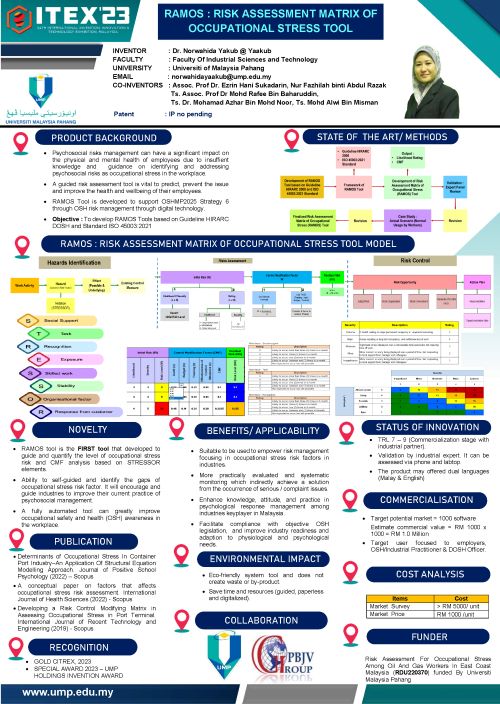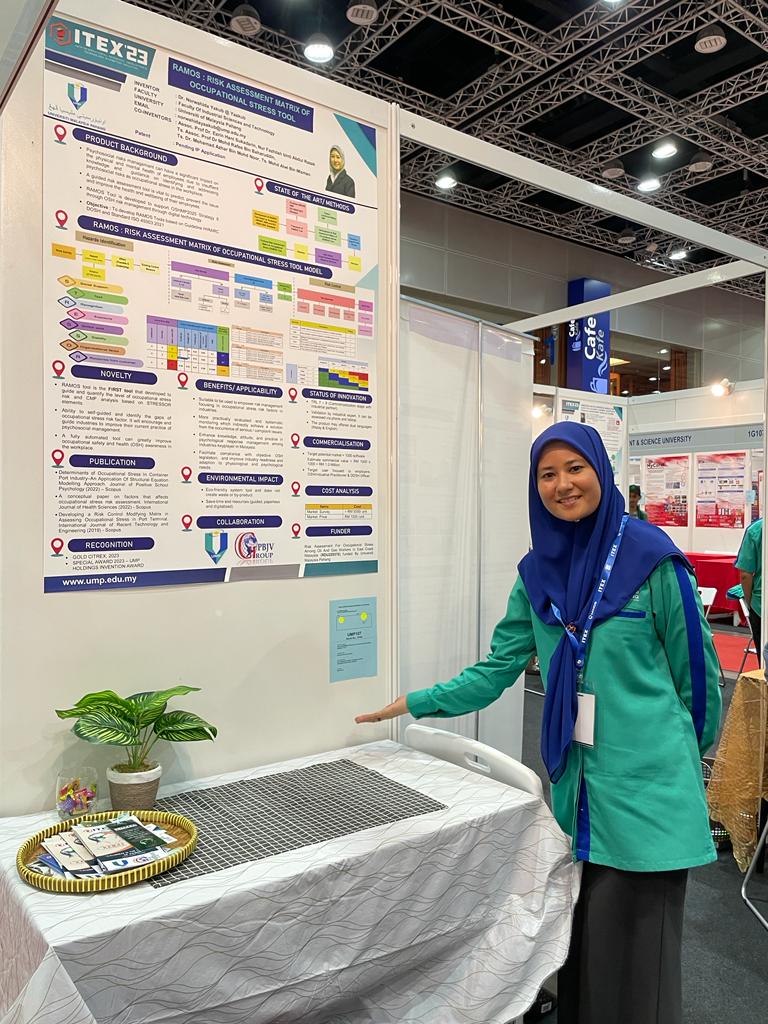Dr. Norwahida developes RAMOS, a user-friendly system to manage work stress
PEKAN, 27 October 2023 - As an industry practitioner facing challenges in analysing risks associated with psychosocial hazards, Dr. Norwahida Yakub, a 35-year-old lecturer from the Faculty of Industrial Sciences and Technology (FSTI) at Universiti Malaysia Pahang Al-Sultan Abdullah (UMPSA), has developed the Risk Assessment Matrix of Occupational Stress (RAMOS), a more time-efficient and user-friendly tool.
The situation has led to hazards that can contribute to mental health issues if not properly analysed, and the existing questionnaire-based methods are time-consuming.
This research was conducted in collaboration with Associate Professor Ts. Dr. Mohd Rafee Baharuddin from Universiti Putra Malaysia (UPM) Associate Professor Dr. Ezrin Hani Sukadarin from Universiti Tun Hussein Onn Malaysia (UTHM), consultant fellow from FSTI, Nur Fazhilah Abdul Razak, and the General Manager of PBJV Group Sdn. Bhd., Ts. Mohd Alwi Misman.
According to Dr. Norwahida, she has proposed the idea of integrating matrices used by the Department of Occupational Safety and Health (DOSH) and several relevant matrices for this research.
“The initial study was conducted in the service industry, specifically at the port. Currently, I am conducting research in the oil and gas industry.
“RAMOS is an instrument designed specifically to measure, assess, and control risks related to job stress in the workplace.
“This tool enables organizations and managers to systematically identify potential hazards and risks related to psychosocial aspects in the workplace, such as job pressure, workload, social interactions, and other factors that can impact the mental and physical health of employees," she said.
She further elaborated that it is the first instrument developed to guide and measure the level of occupational stress risk and CMF analysis based on elements such as social support, task, recognition, exposure, skilled work, stability, organizational factors, and response from customers (STRESSOR).
“Organizations can make informed decisions to mitigate job stress risks, protect the health and well-being of employees, and simultaneously enhance productivity and efficiency within the organization.
“RAMOS is a tool or system that consists of three main phases known as HIRARC, designed to manage and mitigate job stress-related risks in the workplace.
“The first phase is hazard identification (HI), which functions to identify and gather information related to hazards or job stress factors in the workplace, including identifying psychosocial elements through STRESSOR,” she said.
"While the second phase involves risk analysis or risk assessment (RA), covering two stages - initial risk (IR) and residual risk (RR).
“This assessment will be further enhanced by the control modification factor (CMF), providing more clarity on which factors truly contribute to the level of job stress in the workplace.
“An assessment of the effects and acceptability of risks related to stress factors identified in the first phase.
“The users will assess the extent to which these psychosocial hazards can impact the health and well-being of workers, as well as the extent to which this risk can be accepted in the workplace,” she said.
She further explained that the last phase is risk control (RC).
“This phase is about taking control measures to reduce or eliminate the risk of job stress.
“This may involve changes in work processes, task rearrangements, providing training, or offering psychosocial support to employees,” she explained.
She estimates that the cost for the RAMOS tool is RM500, including initial training.
So far, she has collaborated with PBJV Group Sdn. Bhd., an organization that specializes in the oil and gas industry, and together they have become collaborators in the RAMOS research.
“I hope to collaborate further with various industrial sectors to provide them with a better understanding and to develop RAMOS in a user-friendly application.
“In addition, I hope that this research can be further deepened and integrated with various other psychosocial factors, involving more industries.
“I also hope to lead and be involved in collaborations both domestically and internationally with industry players to ensure that RAMOS can be widely and effectively used by society and the industry,” she said.
She mentioned that her objective is to compile the information and insights gained from this study into a guide or training format for industries. With the aims to enhance their ability to manage occupational stress risks effectively.
"In doing so, we can ensure that the mental health and occupational safety of workers become priorities in the industries of the future," she said.

The goal of the RAMOS research is to assist organizations in establishing a baseline on psychosocial issues, managing them effectively using the right approaches, and improving risk management, focusing on factors related to occupational stress in the industry.
She hopes that RAMOS can provide a more practical and systematic means of monitoring organizations, indirectly leading to the resolution of serious issues or complaints.
“RAMOS can also enhance the knowledge, attitudes, and practices related to psychological response management among key players in the Malaysian industry.
“It can assist organizations in objectively complying with occupational safety and health laws (KKP), as well as improving industry readiness and adaptation to physiological and psychological needs,” she further explained.
Previously, this product received a gold medal at the Creation, Innovation, and Technology and Research Exposition (CITREX) 2023, the Special Award 2023 - UMP Holdings Invention Award, and a silver medal at the Human Factors and Ergonomics Malaysia Conference 2023.
At the International Invention, Innovation and Technology Exhibition (ITEX) 2023 held at the Kuala Lumpur Convention Centre (KLCC) from 11 to 12 May 2023, this research also won a silver medal.
By: Nur Hartini Mohd Hatta, Centre For Corporate Communications
Translation by: Aminatul Nor Mohamed Said, UMPSA Career Centre (UMPSACC)
- 201 views










